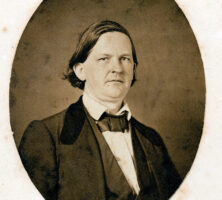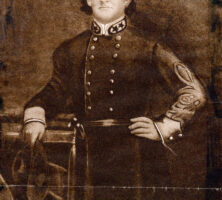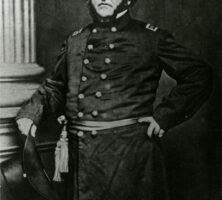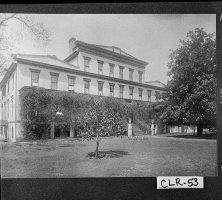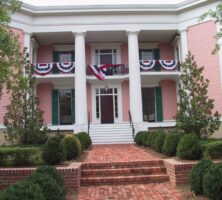Thomas R. R. Cobb was one of antebellum Georgia’s foremost legal authorities and most outspoken advocates of slavery and of secession from the Union. He fought for the Confederacy as a brigadier general and was killed at the Battle of Fredericksburg in 1862.
Early Life
Thomas Reade Rootes Cobb was born at Cherry Hill, a plantation in Jefferson County, on April 10, 1823. His family moved to Athens while he was still a child, and he resided there until his death. Cobb attended the University of Georgia, graduated at the top of his class, and was admitted to the Georgia bar in 1842. In 1844 he married Marion Lumpkin, the daughter of Judge Joseph Henry Lumpkin. They had two sons, who died in infancy, and four daughters.

During the 1840s and 1850s, Cobb and his older brother, Howell Cobb, campaigned against northern and southern radicals whose ideas threatened the Union. While Howell, an influential Democrat, served as Thomas’s political mentor, the younger Cobb focused most of his energies on furthering his brother’s career.
Legal Scholar
Cobb became the reporter for the state supreme court in 1849. While serving in this capacity he published several well-respected legal works, notably The Digest of the Statute Laws of the State of Georgia (1851), a supplement to the state’s existing code of laws; fifteen volumes of reports from the supreme court; and a substantial part of the Code of the State of Georgia (1861), which went into effect after his death.

Beyond Georgia, Cobb was best known for a major contribution to the South’s defense of slavery, which he laid out in a massive volume, An Inquiry into the Law of Negro Slavery in the United States of America (1858). The only legal defense of slavery produced by a southerner, Cobb’s treatise covered a vast range of arguments, from historical precedent and property rights to Black inferiority.
Despite his arguments that the concept of slavery was good and formed the foundation of all great civilizations, Cobb deemed only African slavery to be acceptable in practice because he believed that God intended for Africans to be inferior to whites. Enslavement allowed white Christian masters to “improve” those they enslaved. While most of Cobb’s proslavery defense was discredited after the Civil War (1861-65), some of its legal components continued to influence judicial decisions more than a century after emancipation.
Cobb was a deeply religious man and a leader in the Presbyterian church in Athens. His legal views reflected his puritanical religious beliefs and a desire for restraint and self-control. He supported prohibition of alcohol and prostitution, and he implemented Bible reading in area schools. Cobb advocated forced marriage for couples caught engaging in premarital sex.
Cobb’s evangelical zeal also motivated him to improve educational opportunities. In 1854 his sister, Laura Cobb Rutherford, appealed for a female high school in Athens. Cobb responded by raising money and organizing a group of trustees to form the Athens Female High School. The school opened in January 1859 and was soon renamed the Lucy Cobb Institute in honor of Cobb’s eldest daughter, who died of fever at age thirteen in 1858.

Cobb was also instrumental in reorganizing and expanding the University of Georgia. In 1859 he established the Lumpkin Law School with the aid of his father-in-law, Joseph Henry Lumpkin, a state supreme court justice for whom the school was named.
Southern Nationalist
After the election of U.S. president Abraham Lincoln in 1860, Cobb renounced his Unionist leanings and became an ardent supporter of secession. On November 12, 1860, he delivered a cogent speech in support of immediate secession before the state legislature in Milledgeville. He believed that the Republicans’ victory along strict sectional lines would shift the balance of national power irreversibly to the North, reducing the South to a powerless minority incapable of defending both slavery and its way of life. Afterward, Cobb and his brother Howell campaigned vigorously around the state for secession.

After Georgia seceded from the Union on January 19, 1861, Cobb was elected to the Provincial Congress of the Confederate States of America in Montgomery, Alabama, and served on the committee that drafted the Confederate constitution. The original manuscript is believed to be in his handwriting. Cobb also headed the committee charged with rewriting Georgia’s state constitution.
Frustrated by a lack of cooperation, Cobb resigned from the Confederate congress and in August 1861 formed a regiment of infantry, cavalry, and artillery, known both as the Georgia Legion and as Cobb’s Legion. Commissioned as a colonel by Governor Joseph. E. Brown, Cobb led his regiment into battles at Seven Days, Second Manassas, and Antietam. He became frustrated with his slow advancement through the ranks of command and felt that President Jefferson Davis, General Robert E. Lee, and others were discriminating against him. In October 1862, after assuming command of a brigade formerly led by his brother, Cobb was finally promoted by Lee to brigadier general. He was killed at the Battle of Fredericksburg in Virginia in December 1862.

In 2004 Cobb’s former house generated controversy in Athens. Built in 1839 and presented to Cobb as a gift from his father-in-law, the Federal-style mansion was saved from a wrecking ball in 1985 and moved from Prince Avenue in Athens to Stone Mountain Park, where it languished. The Georgia Trust and the Athens-Clarke Heritage Foundation (now Historic Athens) joined forces with the Watson-Brown Foundation to return the house to Athens in 2004. The move was applauded by preservationists but was opposed by some local residents, who questioned the recognition it brings to the pro-slavery advocate who owned the home. The renovation was completed in 2007, and the home is now open as a house museum and conference site.









